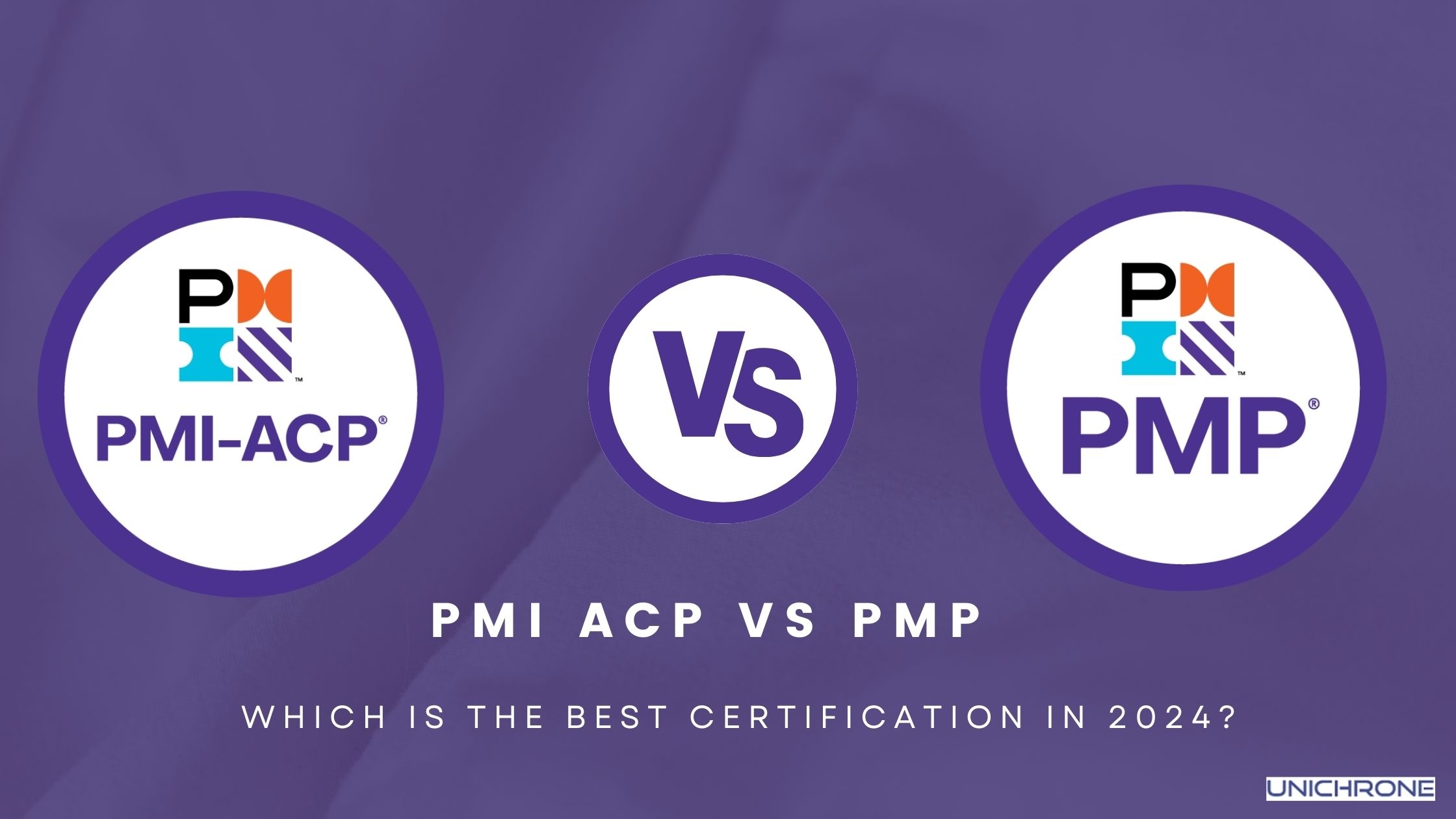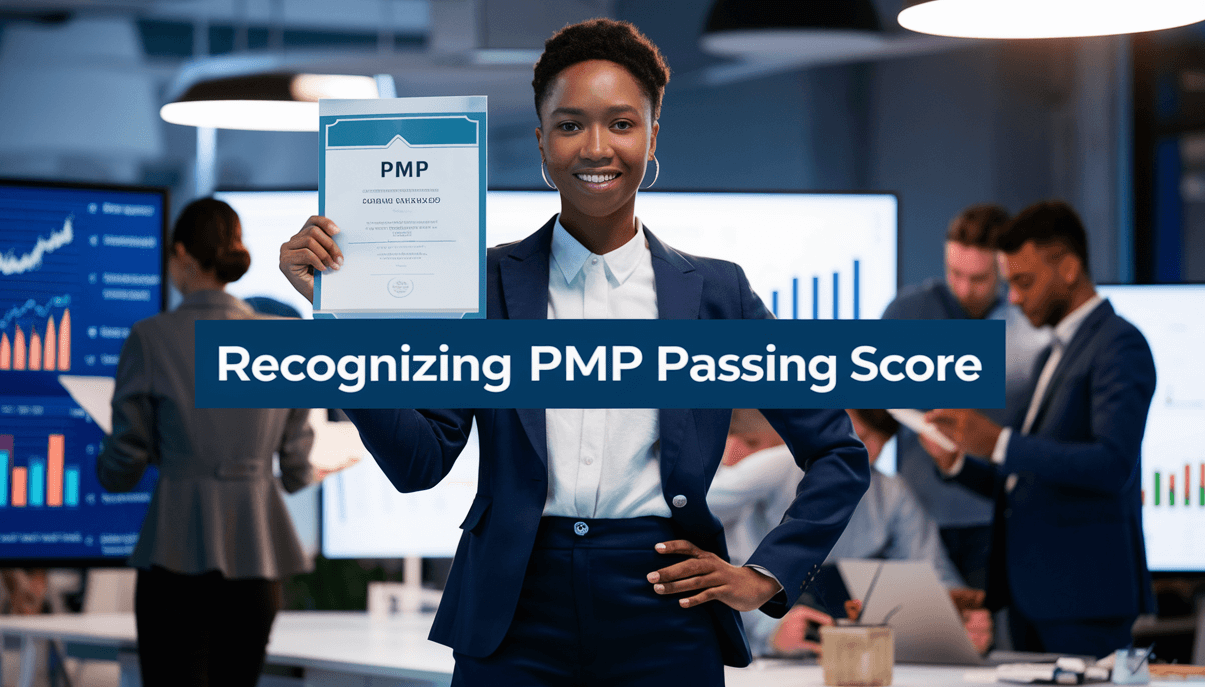PMI (Project Management Institute) offers a diverse range of certifications for professionals looking to enter or are already part of the project management world. It is the world’s leading association for project managers. The institute sets global standards by offering its certifications based on the different levels of experience and specialization within project management. Earning this certificate helps you enhance and cater to your project management skills. PMI offers a wide range of Certifications, but the most up-skilling and trending credentials that we are going to distinguish here are PMI ACP vs PMP. Each pathway caters to your skills for the best. Selecting the correct pathways depends on your career goals and experience.

Jump ahead to
PMI’s Project Management Certifications
The world of Project Management is solely based on the choices and decisions we make in our day-to-day lives or work. One of the most challenging decisions to make is: which certification is best for us, PMP or PMI-ACP? Project Management Institute offers both of these prestigious credentials for professionals in the field of project management. Having either one or both of these certification would lead you to success in your domain. In this ever-changing and bustling environment of the Project Management domain, both stand tall. Each one has a skill set of their own. We cannot choose one as better than the other in any aspect of our domain.
Let’s take a look at how PMI ACP vs PMP Certifications are distinguished in project management.
Why should a professional be PMP or PMI ACP certified?
PMP (Project Management Professional), also called the Gold Standard in Project Management by professionals, could become a beacon of excellence in your domain. It teaches Hybrid, Agile and predictive approaches for the candidates to experience in the Project Management domain. Earning this certification would be a golden ticket for your career, as it enhances your career opportunities and your earning potential.
PMI-ACP (PMI Agile Certified Practitioners) enhances your Agile knowledge. This course is allegedly the most popular course offered by PMI. It offers a deeper knowledge of Agile framework including Scrum, Kanban, Extreme Programming and TDD (Test-Driven Development). Earning this certification would equip you with the skills and knowledge required to blend in with this ever-evolving domain of agile projects. It offers the required skills to be a front-line soldier and fight the army of decision-making in this dynamic environment.
3 Major differences between PMI ACP vs PMP

Let’s give your curiosity some rest, dig deeper into these certifications, and learn the differences between them.
FOCUS
PMP mainly focuses on conventional project management and is applied to a variety of projects. It is broadly based on different methodologies of project management like Waterfall, Hybrid and Agile type of management. As it is a broader concept, PMP is widely accepted by professionals because of its project management success rate. Pursuing the certification requires 3,500–4,500 hours of training and direction in project execution practice. The hours required for this depend solely on the level of education.
PMI-ACP is specially designed for the agile methodologies of project management. The content of this study is based on Scrum, Kanban and Lean. With expertise in this area, an individual can make use of agile techniques to increase the success rate of the project and professional versatility. PMI-ACP would require you to have a total of 3,500 hours of training. These hours would further be decided as: 2000 hours of experience on general projects and 1,500 hours of working on agile terms.
EXAM CONTENT
To obtain PMP Certification, candidates need to demonstrate their professional project management experience. This requires candidates to complete their formal education. Undergoing formal training helps candidates focus on the content of the PMP exam. The exam will consist of 200 MCQs that will require knowledge of areas like – performance domains, models, methods, and artefacts, tailoring, value delivery system, and project delivery principles. Professionals acing this exam can easily gain recognition by organizations following modern project management practices.
On the contrary, candidates keen on becoming Agile Certified Practitioners need to have knowledge of Agile principles, practices, and tools. Each of these domains are specified in the ACP Exam Outline released by PMI. To master these domains, candidates can take up the PMI ACP Training program and then attempt the exam. The ACP exam consists of 100 questions that will be scored and 20 unscored pre-test questions. The allocation of questions can come from any of the seven domains where each domain has specific weightage that aspiring Agile Practitioners need to have knowledge of.
DIFFICULTY
In general, PMP certification is more challenging as it is based on the broader concept of Project Management. The certification deals with the advanced approach to Project Management. It has a longer exam duration of 4 hours, which would cover all the approaches that are relevant to projects. This increases the difficulty of the Project Management Professional Exam. However, candidates who meet the prerequisites set by PMI can clear the PMP Exam without any hassles.
On the other hand, PMI-ACP is considered less challenging and demanding in comparison to PMI. It focuses mainly on the Agile practices of Project Management. The duration of this exam is shorter by an hour (3 hours). It covers the Agile Principles, Tools, and Techniques outlined by PMI. With more companies preferring Agile Certified Practitioners, there is a highly competitive environment for such professionals.
Although the certifications cater to needs of different professionals, PMP and ACP have equal importance.
Which Certificate Should One Choose First?
Both of these certificates are suitable for the approaches they provide for managing projects. We cannot give more credit to a single certification, as both of them are essential in their own way. If you have no prior knowledge of the predictive approach of PM, then an aspirant can go for PMP certification. With your in-depth knowledge of this, you will be able to understand the core of managing projects. But if your projects are already based on the Agile approach, then it wise to choose the PMI-ACP Certification. If you’re a practicing project manager, then it is advised to get as much knowledge as there is to again. Extra knowledge about anything doesn’t hurt anybody. Also, if you have knowledge of both approaches, it would benefit you in your decision-making.
Conclusion:
From the above differences, we can conclude that PMP has a wider approach, whereas PMI-ACP is a more specific approach to Project Management. To achieve success and negotiate complex challenges will require embracing both traditional and agile approaches as the project management landscape continues to change. PMP and PMI-ACP certifications give you the skill sets you need to succeed in this fast-paced work environment, enabling you to make significant contributions to team projects and influence the direction of your industry. So, we cannot rely on just one certification, but to keep up with the changing environment and landscape of the Project Management domain, it is advised to go for both certifications. Candidates can enroll in PMP Certification Training program or PMI ACP Training course to speed up the process of earning the certifications.



